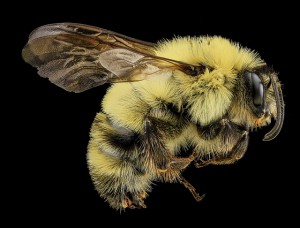“Benign” fungicides negatively affect bumble bees
 Photo credit: USGS Bee Inventory and Monitoring Lab
Photo credit: USGS Bee Inventory and Monitoring Lab
While pesticides have been known to harm bees, fungicides have generally been considered safe. However, now a study published in the scientific journal Insects has demonstrated that exposure to fungicides decreases the overall well-being of bumble bee colonies and puts the next generation at risk for survival. In the study, researchers housed bumble bees in mesh cages in oat fields where they were observed for 29 days. The fungicide, Chlorothalonil, was applied twice over the course of the study on day 0 and day 13. Five colonies were treated with the fungicide and five were used as control groups. Results showed that the colonies exposed to the fungicide treatments produced less than a third as many workers as the control group, had a biomass less than half of the amount of the controls, and the queen bee only had half the body mass of the control queens. The success of a bee colony depends on the capacity of worker bees to forage and collect nectar as well as take care of the queen. However, with fewer and less efficient forager, the queen suffers, leading to a decline in the overall health of the colony. Results from this study suggest that fungicides are not as benign to bumble bees as previously assumed and should be tested further to determine the lasting impacts on bee colony health.

